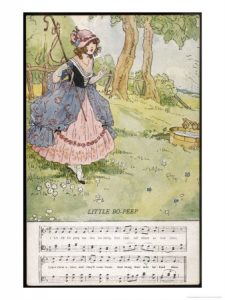
If losing a personal item can be irritating to a grown up with a fully developed brain capable of the most experienced nuances of hide-and-seek, then it must be bewildering to misplace items of importance to the child categorized in the developing stages forming memory experience. Mother Goose’s rhyme about the little girl who lost her lambs can act as a coping mechanism. Caretakers needing to create on the spot anecdotes to comfort little-loved ones brimming with despair latched on to the Bo Peep lesson, remembering she had lost things and came out of the situation unscathed, so at best we can make it a class activity to come out as well.
Father Baum’s Telling Bedtime Stories
The little bo peep lesson had been recited long before in sheep herding territories for hundreds of years, but it wasn’t until 1897 an ex-actor, failed publisher, L. Frank Baum put a story with the rhyme to publish his version called Mother Goose in Prose. Complete with fairies, illustrator Maxfield Parrish, provided images no one would ever have to wonder about again. Acting as a typical bigot of the time had Baum’s adult children apologizing to the Sioux Nation because their father’s printing that extermination of them would be the solution for White expansion. Nonetheless, he married a known feminist at the time, and together they raised his children.
Child Development Scholars read the Children’s Literature of early 1900s
Children accomplish eye-hand coordination skills according to the varying stages called infancy, toddler, and preschooler, explains Swiss developmental psychologist Jean Piaget. Piaget’s long life spanned from 1986 to 1980, he had been a child exposed to etchings. The stages that Erik Erikson identifies, start with Trust versus Mistrust are skills children ages 0-5 develop when interacting with this rhyme. Erickson says involving trust is built through nurturing. If this trust isn’t built it can affect a child’s self-confidence and make them withdrawn.
Ahead of their time, yet children were always in mind
Coping strategies can be taught early, but not too early. Focusing only on what is lost for long periods of time is not a way to solve a dilemma. Current Behavioral Scientist Barbara Oakley advises university students to study by focus and then diffuse. Oakley recommends getting the most out of study sessions by focusing 30-40 minutes with diffusing 5 to 15-minute breaks in between.
Maximize Closeness By Nurturing Listening
The most an adult can get out of the Little Bo Peep class activity nursery rhyme is interaction. Having a chance to replay universal thoughts in 14 words to a preschooler is a tender-moment-monologue performed with meaning. Whether in agreement or not, the concept that lambs will return on their own and therefore not to worry, becomes a solution heard from the most trusted individual with whom cerebral connections are being exchanged with can affect the very nature of young lives. Convincingly soothing, whimsically animated, enunciating an attentive delivery in the form of a nursery rhyme we grew up on reading would convince anybody.